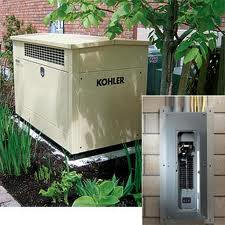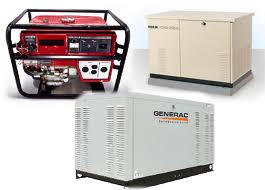Winter is here. It is not too late to prepare for the next winter ice storm and blizzard. Generators are still in stock and ready for delivery. Our licensed electricians are ready for the installation.
What is the definition of a generator: A device that can supply electricity to your home or business during power outages is casually referred to as a generator.
During an emergency, it allows you to continue using essential appliances such as air conditioners, heaters, refrigerators, as well as lights. An electric generator is a device that converts mechanical energy into electric energy. Let one of our qualified licensed electricians discuss your generator options.
Below is more information on choosing the right generator for your needs. There is a generator for every budget. Read the information below and call us today for a free estimate. Remember a licensed electrician should always install generators and outlets. We are here to help you make an informed decision about the best emergency back up generator for home or business use.
HOW TO CHOOSE A GENERATOR
Home generators can be portable or stationary (sometimes referred to as standby). They run on a variety of fuels, such as gasoline, diesel fuel, natural gas (NG), and liquefied petroleum gas (LPG). Portable gasoline models run generally on the least expensive end. For a long term emergency consider standby units. Standby generators come in a variety of KW sizes to suit just about every need. Standby generators will provide continuous power because they are hooked up to an external fuel source, such as natural gas line.
SELECTING THE FUEL
Your choice of fuel should be determined by the type of generator you choose. Most residential standby generators can run on either natural gas or LPG (usually called propane). Portable generators generally run on gasoline.
GENERATOR INSTALLATION
A standby generator is mounted outdoors on a cement pad near the fuel source. Many models already come with a mounting pad, but you still need to prepare a location that is flat and has provisions for water drainage. To prevent exhaust gases from entering a home or business, locate the unit in a well-ventilated area away from doors or windows. Call Sylvia Electrical for a free estimate and to discuss your generator needs.
HOW TO WIRE YOUR SYSTEM
A standby power backup device connects to the home or business wiring via a transfer switch. The transfer switch prevents "back-feeding" into utility lines (which is dangerous and illegal). Many standby generators come with a pre-wired transfer switch. It is strongly recommended that all electrical connections be done by a licensed electrician.
We would be happy to discuss all your generations options with you. Call 978-535-6661 today! Don't be left in the cold.



No comments:
Post a Comment